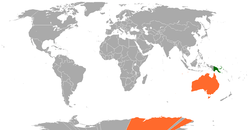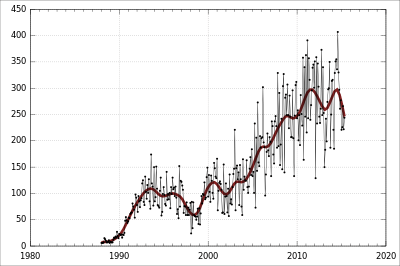Australia–Papua New Guinea relations
 |
|
Papua New Guinea |
Australia |
|---|---|
Australia–Papua New Guinea relations are the foreign relations between Australia and Papua New Guinea. Papua New Guinea is Australia's closest neighbour (with 3.7 km separating the two countries at the nearest point, and with both nations sharing the same continent), and a former dependent territory of Australia. Relations between Canberra and Port Moresby are close, although there have been tensions in recent years. Papua New Guinea has developed much closer relations with Australia than with Indonesia, the only country with which it shares a land border.
The two countries are Commonwealth realms, and Papua New Guinea benefits from economic development aid from Australia. Relations are presently cordial.
History
The southern half of eastern New Guinea (the Territory of Papua) came under Australian administration in 1902, following annexation by the United Kingdom. In 1920, Australia was given a League of Nations mandate to rule German New Guinea, and in 1945 Papua and New Guinea were combined in an administrative union. Papua New Guinea was ruled by Australia until independence in 1975. The two countries retained close relations, with Australia supplying development aid. Papua New Guinea's political institutions are modelled on the Westminster system, shared by Australia.
Recent situation


Relations between Prime Minister Michael Somare (PNG) and Prime Minister John Howard (Australia) were often strained, a strain which culminated in Somare being barred from entering Australia.
In 2001, relations were very good. A detention centre was built on Manus Island, in Papua New Guinea, as part of Australia's "Pacific Solution". Refugee claimants seeking asylum in Australia were sent to Manus Island (or Nauru), and Australia paid for the costs of their detention, providing Papua New Guinea with economic aid. The last inmate was Aladdin Sisalem, who was kept in solitary confinement from July 2003 until he was finally granted asylum in Australia in June 2004. Australia continued to pay for the upkeep of the empty detention centre until late 2007.
In March 2005, Somare was required by security officers at Brisbane Airport, Australia, to remove his shoes during a routine departure security check. He took strong exception to what he considered a humiliation, leading to a diplomatic contretemps and a significant cooling of relations between the two countries. A protest march in Port Moresby saw hundreds march on the Australian High Commission, demanding an apology.[1]
In 2006, tensions between Papua New Guinea and Australia worsened due to the "Julian Moti affair". Moti, a close associate of Manasseh Sogavare, the then Prime Minister of the Solomon Islands, was arrested in Port Moresby on 29 September 2006 under an Australian extradition request to face child sex charges in relation to events in Vanuatu in 1997. After breaking bail conditions and taking sanctuary in the Solomon Islands High Commission, he was flown to the Solomon Islands on a clandestine PNG Defence Force flight on the night of 10 October, causing outrage on the part of the Australian government. Australia then cancelled ministerial-level talks in December and banned senior Papua New Guinea ministers from entering Australia.[2]
In 2007, both prime ministers faced elections. Somare was re-elected, but Howard was defeated and succeeded by Kevin Rudd. Rudd soon set out to mend Australian-PNG relations. He met his Papua New Guinean counterpart in Bali in December 2007 to resume normal diplomatic relations.[3] In March 2008, Rudd visited Papua New Guinea.[4]
External links
References
- ↑ "PNG rally against Australia's treatment of PM Somare". Radio New Zealand International. Retrieved 2 August 2007.
- ↑ "PNG report says PM Somare should be charged over Moti escape". Radio New Zealand International. Retrieved 2 August 2007.
- ↑ "Solomons sacking ends chill", Brendan Nicholson and Mark Forbes, The Age, 14 December 2007
- ↑ "Papua New Guinea and Australia", The National, 7 March 2008
| ||||||||||||||||||||||||||||
| |||||||||||||

